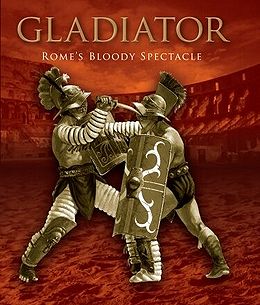Gladiator
A Gladiator was a combatant in ancient Rome who fought for sport and as a game for those who watched. It came from the Roman word gladius meaning "sword", also indicating the weapon often associated with the gladiators. Gladiators themselves could fight with a number of different weapons, and having varying weapons often made the games more 'exciting'. While popular mythology states that gladiators fought to the death, these matches were very rare; gladiators were expensive to train, feed, and care for and as such fighting to the death would have been very bad business. Fights rarely ended in death and if a gladiator died as a result of the match, the sponsor of the match would be required to compensate the gladiator's owner.
Gladiator contests were common through most of the time of Rome, spanning a time period of hundreds of years. The Roman Colosseum had many gladiator contests, some of them quite ingenious Some games were quite costly. Many were sponsored by the state or paid for by rich individuals. Games could be held in honor of someone who died or for important events, like a military victory.
Gladiators were usually prisoners of war or slaves but it wasn't uncommon for free Romans to become gladiators because of the fame and fortune that success in the arena would bring them. Highly successful gladiators could be known to earn their freedom.
One of the most famous gladiators was Spartacus, not because of his fighting in the arena, but because of the slave revolt he led during the later Roman Republic that took more than a year to put down.
It took over a century, from Constantine in 325 to Valentinian III in 438 for the games to be terminated.
Further reading
- Nossov, Konstantin. Gladiator: Rome's Bloody Spectacle (2009) 224pp
